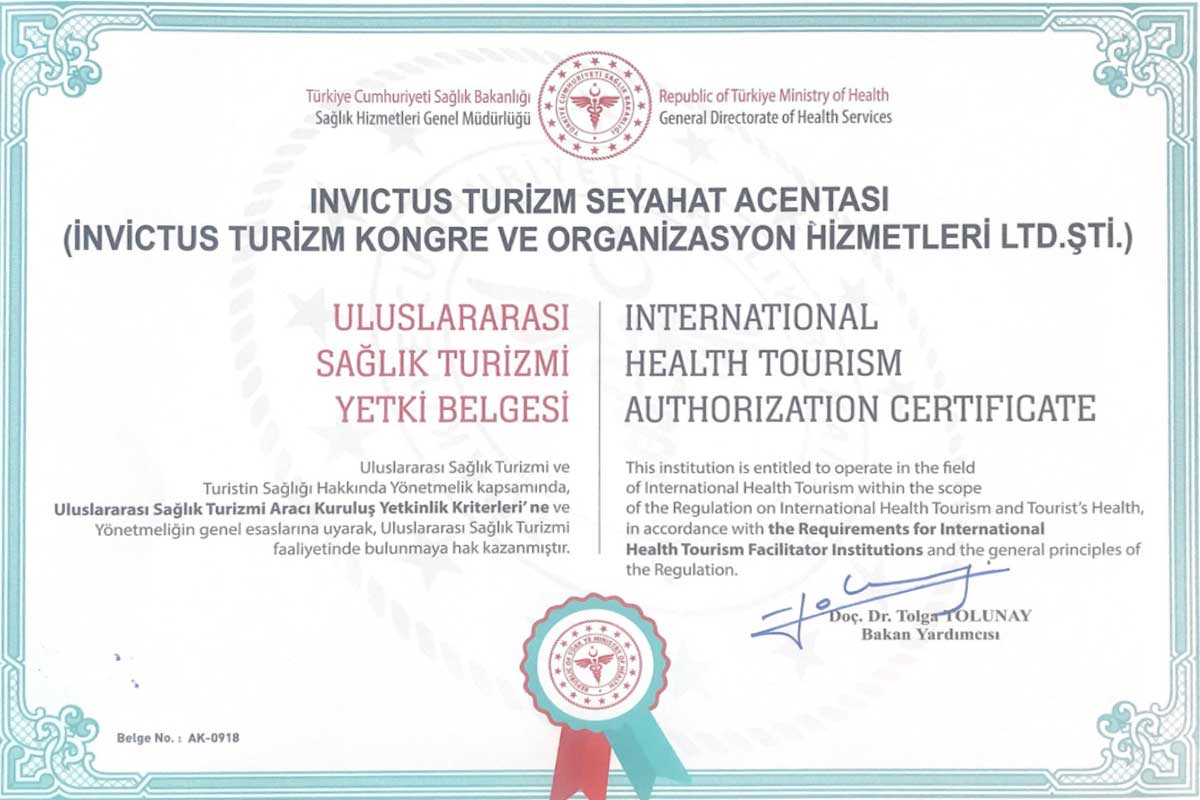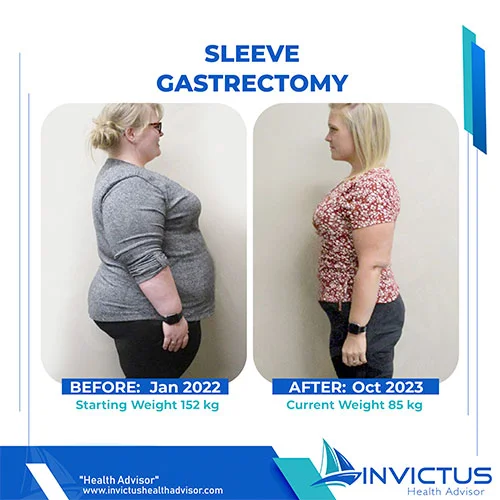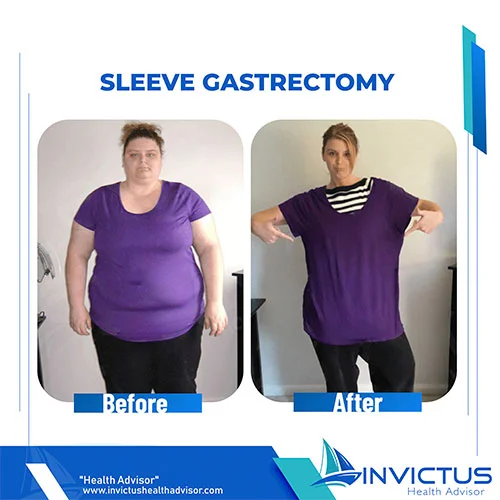Free Consultation Form
Bariatric surgery, also known as bariatric surgery, is a general term for surgical procedures performed to promote weight loss and treat weight-related health problems in overweight or obese individuals.
WHY CHOOSE INVICTUS HEALTH ADVISOR
Bariatric surgery procedures are considered when other weight loss methods such as diet, exercise, and lifestyle changes have not worked or have not yielded satisfactory results for patients.
The goal of bariatric surgery is to help patients lose weight and maintain it long-term. It is also designed to prevent obesity-related health problems and improve patients’ quality of life.
Typically, bariatric surgery involves changing or restricting part of the digestive system so that less food is taken in and/or absorbed. This helps with weight loss and maintenance.
 Bariatric Surgery Treatments
Bariatric Surgery Treatments
Gastric Reduction Surgery – Gastric Bypass
A procedure to reduce the size of the stomach and bypass a section of the intestine. This way, less food is taken in and the absorption of nutrients is partially blocked.
Sleeve Gastrectomy
A procedure that involves removing a large portion of the stomach and reducing it to a smaller tube shape. This helps you eat less food and feel fuller.
Adjustable Gastric Banding
A method of restricting the stomach by dividing the upper part of the stomach and using a band that creates a small reservoir. This band helps control the speed of eating and portion size.
Duodenal Switch – Biliopancreatic Diversion
Involves reducing the size of the stomach while bypassing part of the intestine, thus reducing nutrient absorption.
Bariatric surgery can be an important option for individuals who are severely obese and have obesity-related health problems. However, since such surgical procedures carry serious risks, it is important that candidates are carefully evaluated and guided by a qualified healthcare team. In addition, regular follow-up and adherence to lifestyle changes are required after the surgical procedure.
Bariatric surgery procedures are considered when other weight loss methods such as diet, exercise, and lifestyle changes have not worked or have not yielded satisfactory results for patients.
The goal of bariatric surgery is to help patients lose weight and maintain it long-term. It is also designed to prevent obesity-related health problems and improve patients’ quality of life.
Typically, bariatric surgery involves changing or restricting part of the digestive system so that less food is taken in and/or absorbed. This helps with weight loss and maintenance.
 Bariatric Surgery Treatments
Bariatric Surgery Treatments
Gastric Reduction Surgery – Gastric Bypass
A procedure to reduce the size of the stomach and bypass a section of the intestine. This way, less food is taken in and the absorption of nutrients is partially blocked.
Sleeve Gastrectomy
A procedure that involves removing a large portion of the stomach and reducing it to a smaller tube shape. This helps you eat less food and feel fuller.
Adjustable Gastric Banding
A method of restricting the stomach by dividing the upper part of the stomach and using a band that creates a small reservoir. This band helps control the speed of eating and portion size.
Duodenal Switch – Biliopancreatic Diversion
Involves reducing the size of the stomach while bypassing part of the intestine, thus reducing nutrient absorption.
Bariatric surgery can be an important option for individuals who are severely obese and have obesity-related health problems. However, since such surgical procedures carry serious risks, it is important that candidates are carefully evaluated and guided by a qualified healthcare team. In addition, regular follow-up and adherence to lifestyle changes are required after the surgical procedure.
Bariatric Surgery Before & After
Bariatric Surgery Overview
Let’s Plan Your Treatment Together in Turkey
PLAN YOUR TREATMENT IN TURKEY
Let us share with you how this magnificent transformation adventure, which begins from the moment you meet us, works.
ONLINE MEETING
VIP TRANSFER
We welcome you at the airport and bring you to our clinic safely in private vehicles.
YOU ARE OUR GUEST
We offer hotel accommodation during your treatment stay.
TREATMENT
Your doctor will create a plan. Surgery takes 3-4 hours, followed by a 1-night stay. After a final check-up, you’ll be discharged.
INTERPRETER SUPPORT
Enjoy healthcare in your own language with interpreter support before, during, and after treatment.
Free Consultation Form
Frequently Asked Questions About Bariatric Surgery
Bariatric surgery is a weight loss surgery performed to treat obesity. It involves procedures aimed at reducing the stomach or reducing food absorption.
Those with a Body Mass Index (BMI) of 40 and above
Suitable for those with a BMI between 35-40 and obesity-related health problems (diabetes, high blood pressure, sleep apnea).
Sleeve Gastrectomy: A large portion of the stomach is removed and the stomach is reduced.
Gastric Bypass: The stomach and small intestine are reconstructed to restrict food absorption.
Gastric Band: An adjustable band is placed over the upper part of the stomach.
Duodenal Switch: A more complex procedure that involves reducing the stomach and restructuring the intestinal tract.
Interviews with a dietitian and surgeon
Blood tests and imaging tests
Psychological evaluation
A special diet may be applied for weight loss before surgery.
Depending on the type of surgery and the patient’s lifestyle, 50-70% of excess weight can be lost within the first year.
Since the surgery is usually performed laparoscopically, pain is minimal. Most patients can return to normal activities within a few days.
A liquid diet is followed for the first few weeks, then soft and solid foods are introduced.
Portions are reduced, and a high-protein, low-carb diet is recommended.
Yes, vitamin and mineral absorption may be reduced, especially after gastric bypass and sleeve gastrectomy surgeries. Multivitamin, iron, calcium and B12 supplements are usually recommended.
Surgical complications such as bleeding, infection, leakage
Nutritional deficiencies
Dumping syndrome (stomach discomfort after eating).
These risks can be minimized with the follow-up of a specialist surgeon.
Light walks can be started immediately. More intense exercises can be started after 4-6 weeks with the approval of the doctor.
Yes, weight gain is possible if lifestyle changes are not followed. Healthy nutrition and regular exercise increase the success of this process.
Yes, fertility may increase since hormonal balances change after surgery. It is generally recommended to wait 12-18 months before planning a pregnancy.
Excess skin may form due to rapid weight loss. In this case, corrective procedures can be performed with plastic surgery.
We Continue to Be a Secure Bridge Between You and Turkey!

In order to ensure reliability in health tourism, the Turkish Ministry of Health requires intermediary service organisations such as us and health institutions to fulfil certain competence criteria. Organisations that can fulfil these criteria are entitled to receive the International Health Tourism Authorisation Certificate and prove that they are a reliable organisation in the sector.

 Bariatric Surgery Treatments
Bariatric Surgery Treatments

